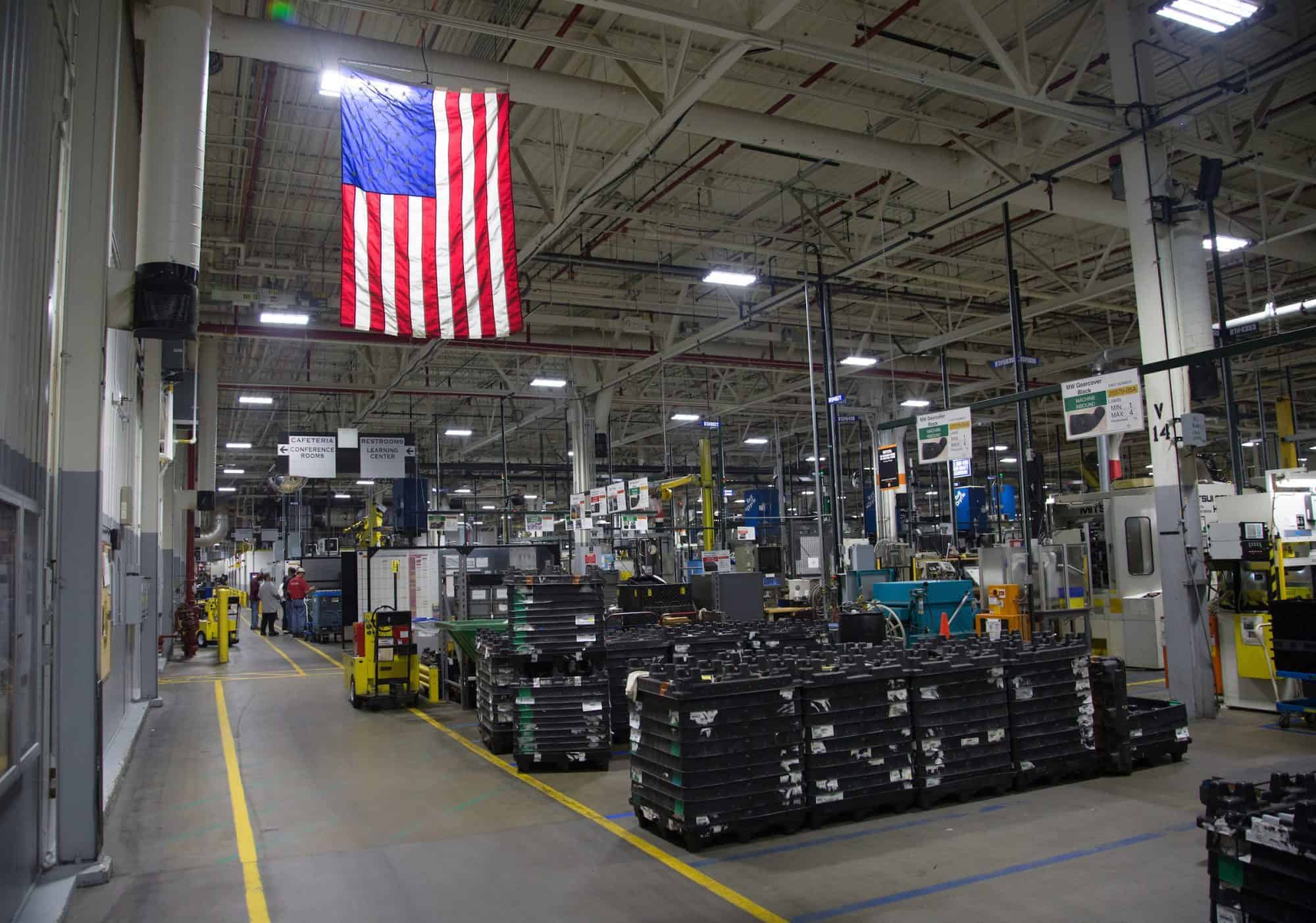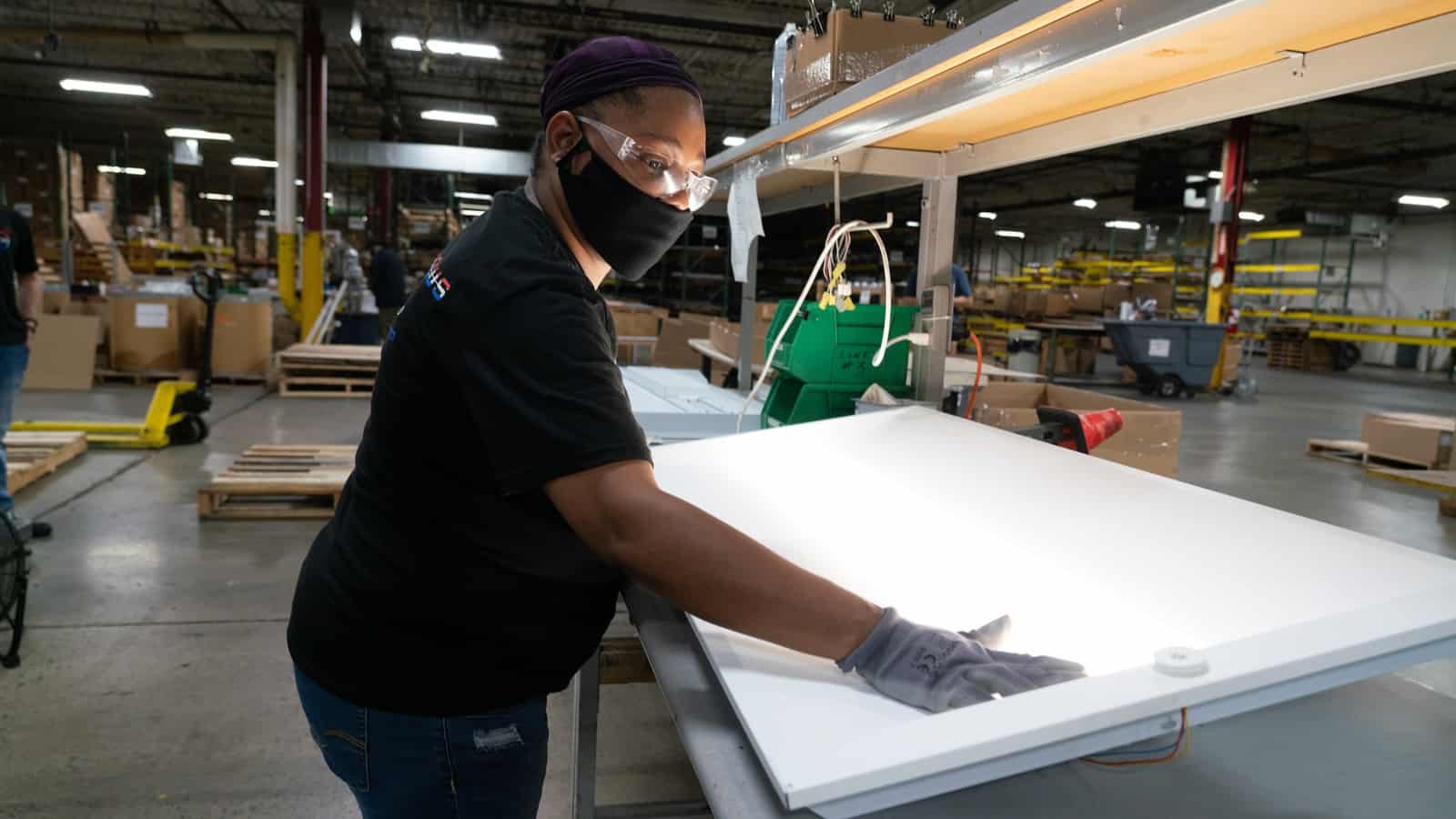How NAM Cyber Cover Helps Manufacturers

Cyberspace seems to get more dangerous every day. The latest scare comes from the likely Russian hack of tech company SolarWinds’ software, which affected several U.S. government agencies along with major corporations. But manufacturers can give themselves some peace of mind by investing proactively in security measures—such as cyber insurance.
One industry executive is very happy with his decision to buy cyber coverage from the NAM to protect his company. After its sister company was attacked in a cyber incident, Manitoba Corporation’s Partner and Vice President of Marketing Adam Shine shopped around for plans that would safeguard the family-run metal recycling business based in New York. After considering his options, Shine signed up with NAM Cyber Cover because it offered proactive protection in addition to coverage, tailored to manufacturers at a competitive price.
“I think the NAM has done a good job of providing value for money, so it’s not like you’re just writing a check for cyber insurance on an if-come basis,” said Shine. “You’re actually signing up for some user training and some tools that will help you mitigate that risk.”
What it is: NAM Cyber Cover is a cybersecurity and risk-mitigation program developed exclusively for the NAM’s member companies and organizations in partnership with AHT Insurance and Coalition, which specializes in underwriting cyber and technology insurance.
What it offers: Cyber Cover presents a range of benefits for manufacturers seeking to secure themselves against cyber intrusions, allowing them to:
- Manage risks through a free Cyber Risk Assessment, as well as gain access to threat monitoring and vulnerability alerts;
- Mitigate the severity of intrusions with training platforms and programs that help employees recognize issues, while also working with ethical hackers to identify vulnerabilities;
- Receive 24-hour-a-day coverage from Cyber Cover support; and
- Recover from an attack with instant support that helps manufacturers survive and rebuild after a breach.
The word from Manitoba: “Speaking from experience, don’t think it can’t happen to you,” said Shine. “[Cyber attackers are] targeting every company from every walk of life…. To know that you have coverage and a safety net is critical. I would highly advise everybody now to have cyber coverage.”
The word from the NAM: “Modern manufacturers are deploying advanced technologies that are transforming what we make and how we make it. This rapid digitization and the workplace disruptions created by the COVID-19 pandemic have created new and unprecedented risks for our members,” said NAM President and CEO Jay Timmons. “Our partnership with AHT and Coalition will help protect our industry from cyberattacks and ensure we can continue to lead our economic recovery and renewal.”
Watch this interview with Shine about his experience, and take a look at what Cyber Cover offers here.
Congress’s Funding Package: What Manufacturers Should Know

Congress’s new funding package, which covers COVID-19 relief and much more, will provide Americans with much-needed security during this holiday season. Manufacturers are among the major beneficiaries, as Congress recognized that the sector is essential to keeping our country healthy, fed and functional throughout the pandemic.
The NAM’s policy team reports that legislators closely followed the NAM’s recommendations in a wide variety of policy areas. Here are a few highlights.
The Paycheck Protection Program: This program was reauthorized with $284 billion in new funding and extended through March 31, 2021. It also lets businesses choose when to spend the loans, expands the list of acceptable uses for the loans and simplifies loan forgiveness.
Taxes: The last round of stimulus, called the CARES Act, included a payroll tax credit for “eligible employees” affected by the virus. This new package extends that credit through June 30, 2021, while also upping the percentage from 50% to 70%. Meanwhile, it increases the amount of workers’ pay that qualifies for this tax credit from $10,000 for the year to $10,000 per quarter.
And that’s not it for taxes. This package also extends or makes permanent many other provisions. For example, it extends the deadline by which workers must pay back deferred payroll taxes, while also extending the temporary, refundable tax credit for small and medium-sized employers that are providing required paid leave.
Labor: As you’ve probably read by now, the package gives workers on unemployment $300 per week on top of their state benefits. These payments will last until March 14, 2021.
Vaccines/COVID-19 care: And now for the measures that will help end this pandemic for good. The package includes $20 billion for the purchase of vaccines, making them free for all who need them; $8 billion for vaccine distribution; $20 billion to assist states with testing; and a $20 billion distribution from the existing provider relief fund.
And we’re still not finished . . .
Long-term fixes: Congress also included manufacturing priorities that predate the pandemic and remain absolutely crucial.
- Energy: This is the big one—the first comprehensive modernization of U.S. energy policy in well over a decade, and an upgrade that the NAM has long fought for. We can’t cover all of its many provisions here, but they include everything from energy storage to nuclear development to carbon capture to renewable energy. It’s a major victory for manufacturers and the NAM.
- Environment: The legislation also includes a provision for phasing down hydrofluorocarbons—greenhouse gases used in refrigeration. Relatedly, it creates new R&D programs for technologies that can reduce greenhouse gas emissions in the power sector. Both are high priorities for manufacturers’ sustainability efforts.
- Anti-counterfeiting measures: These measures are designed to protect manufacturers’ intellectual property, and they include the empowerment of the Federal Trade Commission to take action against bad actors exploiting the pandemic.
- Transportation: As part of this package, Congress passed the bipartisan Water Resources Development Act, which provides a two-year authorization for ports, inland waterways and important water infrastructure investments.
- Broadband: And lastly, the package funds the improvement of digital infrastructure and broadband access, including for underserved and rural populations. It also includes a support program for those experiencing hardship due to COVID-19.
What’s missing? Since you ask, the package does not include the liability protections that the NAM advocated. But the NAM will continue working on this priority next year.
The last word: NAM President and CEO Jay Timmons said of the legislation, “Some are stirring up controversy over aspects of the spending text to drum up ratings or score political points. But the bottom line is manufacturers—and all Americans—need relief now. This package gives manufacturers and many other Americans a lifeline in the face of the disaster this pandemic continues to wreak on lives and livelihoods. There is unfinished work for sure. But it makes no sense to hold up an action that can bring real relief to this country.”
You can read a more expansive list of policy wins here.
Manufacturers Secure Priorities in Year-End Stimulus Legislation
Stoick: “We have been fully engaged with House and Senate leaders to keep this vital work going"
Washington, D.C. – Following passage of Senate amendment to H.R. 133 – United States Mexico Economic Partnership Act [Consolidated Appropriations Act, 2021], National Association of Manufacturers Vice President of Government Relations Jordan Stoick released the following statement:
“Manufacturers secured many of our top priorities in this important legislation, including numerous provisions the NAM first proposed in our ‘American Renewal Action Plan.’ The additional funds for the Paycheck Protection Program will provide a continued lifeline for small manufacturers. Furthermore, the resources for testing and vaccine distribution, as well as tax incentives for manufacturers that keep employees on payroll and invest in safety measures, will ensure America’s dedicated, essential manufacturing workers can continue their mission safely.
“Across the country, manufacturers are providing the vaccines, PPE and supplies needed to defeat COVID-19, so we have been fully engaged with House and Senate leaders to keep this vital work going. We have a difficult winter ahead, and this legislation will help save lives and livelihoods and keep manufacturers operating. As folks continue to roll up their sleeves and receive initial doses of the vaccine, we are also looking to the other priorities facing us in the new year—including historic investments in infrastructure, energy innovation and more—to ensure manufacturers can lead a full economic recovery and American renewal.”
-NAM-
The National Association of Manufacturers is the largest manufacturing association in the United States, representing small and large manufacturers in every industrial sector and in all 50 states. Manufacturing employs more than 12.2 million men and women, contributes $2.35 trillion to the U.S. economy annually and has the largest economic multiplier of any major sector and accounts for 62% of private-sector research and development. The NAM is the powerful voice of the manufacturing community and the leading advocate for a policy agenda that helps manufacturers compete in the global economy and create jobs across the United States. For more information about the NAM or to follow us on Twitter and Facebook, please visit www.nam.org.
Senators Introduce R&D Bill

A coming tax change would make it more expensive for manufacturers to undertake cutting-edge innovation—but a bipartisan Senate bill championed by the NAM is set to change that.
Where we are: Right now, if you’re running a business and you invest in research and development, you can immediately deduct 100% of those expenses in the year in which they are incurred. However, beginning in 2022, businesses will be forced to spread their R&D deductions out over a period of years, making it more expensive for manufacturers to undertake R&D. If this change were to go into effect, the United States would also be the only industrialized country in the world with this policy, harming our ability to compete internationally and invest for growth.
The cavalry arrives: The American Innovation and Jobs Act, a bipartisan bill introduced on Tuesday by Sens. Maggie Hassan (D-NH) and Todd Young (R-IN) would repeal the looming change, allowing businesses to continue to deduct their R&D expenses immediately. The bill would also make the R&D tax credit more accessible and more generous for small businesses.
Why it matters: Manufacturers perform the vast majority—nearly two-thirds—of private-sector R&D in the United States. That work not only helps finance important new projects and technological advancements, but it also helps to create well-paying jobs and power economic growth. That’s why the NAM has been leading the business community in getting bipartisan legislation introduced in the House and now in the Senate to stop this harmful change from going into effect.
A word from the NAM: “Research and development is the lifeblood of manufacturing,” said NAM Senior Director of Tax Policy David Eiselsberg. “It is what drives innovation, competitiveness, economic growth and the creation of high-paying jobs. This legislation will ensure that the tax code continues to support the ability of manufacturers to undertake R&D that will help promote economic and job growth.”
Why America Is a Great Location for Manufacturers

Manufacturing is a key driver of the American economy—but how does manufacturing in the United States stack up against the rest of the world?
Recently, The Manufacturing Institute and KPMG—a professional services firms providing innovative business solutions and audit, tax, and advisory services—released a new assessment of the cost of doing business in the manufacturing sector for the United States and 16 other major manufacturing exporting nations around the globe.
High costs, but high value: The study found that primary costs (compensation, property, utilities, taxes and interest rates) in the U.S. are on average 16% higher than in the other markets—yet the U.S. ranks fairly high on the list overall at #5.
- Another number bears that out: over the past decade, foreign direct investment in U.S. manufacturing has jumped from $569.3 billion in 2006 to a record $1,785.7 billion in 2019.
The benefits of tax reform: Tax reform made the U.S. a more desirable location for manufacturers, the study found. It compared how the U.S. would have ranked with its pre-reform corporate tax rate of 40% (the combined federal and state tax rate) instead of the post-reform corporate rate of 27%. With the old rate, the U.S. would have ranked only 11th.
The benefits of skilled workers: A major U.S. advantage is its supply of high-skilled workers. According to the study, the U.S. ranks at the top of the list for real value added per employee, along with Ireland and Switzerland. As manufacturing has become increasingly advanced, the need for sophisticated employees keeps growing.
While it’s true that American manufacturing requires more skilled workers, as The Manufacturing Institute has previously shown, the existing workforce is still a big draw due to its productivity.
The bottom line: The United States is an attractive location for manufacturers, despite relatively high costs, because of high worker productivity and the overall business environment.
The last word: “We need to continue to push the envelope of technological innovation and workforce development and recruitment in the manufacturing sector,” said Chad Moutray, chief economist for the National Association of Manufacturers and director of the Center for Manufacturing Research at The Manufacturing Institute. “These efforts will serve to strengthen the sector overall, but also help to maintain the nation’s global competitiveness.”
Manufacturing Leadership Awards Celebrate Innovative Manufacturers

Last night, the 2020 Manufacturing Leadership Awards Gala recognized some of the most innovative manufacturers in the country, at a virtual event hosted by the NAM’s Manufacturing Leadership Council. The MLC is a global business leadership network dedicated to preparing manufacturers for the opportunities and challenges posed by digitization, automation and technical advancement.
The winners: Presented to individuals and companies in 12 categories, including Sustainability Leadership and Artificial Intelligence and Analytics Leadership, the awards honor world-class manufacturing achievements. You can find the full list of honorees here.
The word from the MLC: “Creativity. Innovation. Excellence. Enlightened leadership. These are the qualities that drive the people of manufacturing to create a better future,” said MLC Co-Founder and Executive Director David Brousell in his opening remarks. “In doing so, they help themselves, their companies and our collective industry improve the quality of life for everyone. . . . All across this country, innovation in manufacturing is on the march.”
Manufacturer of the Year: The MLC honored two manufacturers with Manufacturer of the Year awards: agricultural chemical and seed company Corteva Agriscience, and Humtown Products, which was honored for its work to popularize 3D printing in sand cores. You can check out our profile of Humtown here.
Manufacturing Leader of the Year: This award went to Gerald Johnson, executive vice president, global manufacturing at GM, for his leadership in GM’s pivot to ventilator production in a partnership with Ventec Life Systems, code named Project V.
High Achiever Award Winners: The judges also presented high achiever awards to one winner in each category. Here’s the list:
- Lockheed Martin Corporation in the Artificial Intelligence and Advanced Analytics Leadership category for F-35 Augmented Reality Shop Floor Mobility
- Merck & Co., Inc., in the Collaborative Innovation Leadership category for Digital Fingerprinting
- Humtown Products in the Engineering and Production Technology Leadership category for Commercialization of 3D Printing in the Metal Casting Industry
- IBM in the Enterprise Integration Technology Leadership category for Migrating Supply Chain Quality Workload to Cloud
- Cooley Group in the Industrial Internet of Things Leadership category for Transforming Legacy Machinery into Smart Tech
- Hologic Inc. in the Operational Excellence category for Building a Culture of Operational Excellence
- Starkey Hearing Technologies in the Supply Chain Leadership category for Supply Chain Management Transformation
- The Boeing Company in the Sustainability Leadership category for Diverting Waste to Landfill While Upcycling Excess Airplane Carbon Fiber
- Nexteer Automotive in the Talent Management category for the Manufacturing Engineering Global Talent Management and Training Program
Government Mandates Will Not Lower Drug Costs
Timmons: “We should not import failed socialist price controls”
Washington, D.C. – National Association of Manufacturers President and CEO Jay Timmons released the following statement on the administration’s proposed rules to address drug pricing.
“We should not import failed socialist price controls, and we are surprised that President Trump and Secretary Azar would consider such actions. Our battle with COVID-19 shows just how vital pharmaceutical innovation is to our health and survival, and we cannot afford to limit companies’ ability to develop lifesaving treatments for this or future medical crises.
“Importing drugs from foreign countries that don’t guarantee the same standards for drugs made for the U.S. market poses a serious health risk, especially considering the counterfeiting challenges we already face.
“If enacted, tying any portion of our system to a foreign government-run health care system, through International Price Indexing or other means, is an abdication of free market principles.
“Manufacturers of all sectors are committed to lowering health care costs, and we call on the administration to commit to better market-based solutions that won’t hand over private-sector decisions to foreign governments, potentially impacting Medicare recipients and impacting our ability to help provide lifesaving medicines.”
-NAM-
The National Association of Manufacturers is the largest manufacturing association in the United States, representing small and large manufacturers in every industrial sector and in all 50 states. Manufacturing employs more than 11.7 million men and women, contributes $2.37 trillion to the U.S. economy annually and has the largest economic multiplier of any major sector and accounts for 63% of private-sector research and development. The NAM is the powerful voice of the manufacturing community and the leading advocate for a policy agenda that helps manufacturers compete in the global economy and create jobs across the United States. For more information about the NAM or to follow us on Twitter and Facebook, please visit www.nam.org.
The NAM Takes Aim at Counterfeiting

Business advocates and policymakers have a new tool for waging an aggressive effort against counterfeiting during the pandemic and beyond. The NAM has released a new report, “Countering Counterfeits,” which includes proposed solutions for Congress, the administration and the private sector to pursue.
The numbers: According to the NAM’s research, fake and counterfeit products cost the United States $131 billion and 325,000 jobs in 2019 alone.
The rising tide: The rise of e-commerce has caused an explosion in fake products, particularly from China. E-commerce has created a pipeline to consumers that counterfeiters can exploit while hiding their identities and evading oversight. Estimates now indicate that global trade in counterfeits exceeds $500 billion per year.
The plan: The NAM’s proposal pushes for a series of actions to help curb counterfeiting, including:
- Requiring e-commerce platforms to reduce the availability of counterfeits;
- Modernizing enforcement laws and tactics to keep pace with counterfeiting technology;
- Streamlining government coordination to tackle counterfeit items;
- Improving private-sector collaboration; and
- Empowering consumers to avoid counterfeit goods.
The NAM says: President and CEO Jay Timmons said in his introduction to the report, “The prevalence of counterfeits in the COVID-19 response has brought new urgency to this long-simmering issue. So the National Association of Manufacturers is leading the charge against fake and counterfeit goods, bringing together diverse stakeholders and driving innovative policy solutions to address these issues once and for all and to ensure the long-term success of our sector and the safety and security of the people who rely on our products.”
Report: U.S. Leads in Pharma Innovation, Thanks to Effective Policies

The new report from the ITI Foundation offers strategies to maintain U.S. strength, spur greater innovation and increase domestic production.
U.S. policies spur success: “America still leads in innovation and drug development, in large part due to effective life-science policies, including significant federal investment in life-sciences basic research, robust intellectual property (IP) protections, effective technology transfer policies, investment incentives, and, importantly, drug pricing policies that enable companies to invest in high-risk drug development.”
Recommendations for policymakers: The paper suggests U.S. policymakers should focus on four key areas:
- Maintaining U.S. strength in pricing, tech transfer and intellectual property—and avoiding oppressive drug price control schemes that damage competitiveness;
- Boosting innovation through investment and additional tax incentives that promote research and development;
- Increasing domestic production, including via tax credits and additional funding for key research institutions; and
- Combating foreign mercantilism by making sure that America’s trading partners pay their “fair share” for new drugs, treatments and other medical products.
Innovation in the time of COVID-19: At a time when U.S. pharmaceutical companies are central to the fight against a global pandemic, the ability to innovate successfully is of paramount importance. The U.S. House Committee on Energy and Commerce held a hearing on Tuesday that discussed the issue, titled “Pathway to a Vaccine: Efforts to Develop a Safe, Effective and Accessible COVID-19 Vaccine.”
The NAM says: “The research ecosystem we have in the United States supports a global leadership position of biopharmaceutical innovation,” said NAM Vice President of Infrastructure, Innovation and Human Resources Policy Robyn Boerstling. “Manufacturers are committed to building upon that innovation—but it’s clear that government-led pricing restrictions and importing bad health care policies used by our competitors is not the way forward.”
Related . . . The NAM has launched a new six-figure television and digital ad campaign aimed at potential rules to address drug pricing through International Price Indexing and drug importation.
NAM Launches Cyber Cover to Protect Manufacturers
AHT Insurance and underwriter Coalition partner with the NAM to deliver cybersecurity solution
Today, the National Association of Manufacturers announced the launch of NAM Cyber Cover, an exclusive cybersecurity and risk mitigation program for its member companies and organizations. This critically important and timely offering was developed in partnership with AHT Insurance and Coalition, which specializes in underwriting cyber and technology insurance.
“Modern manufacturers are deploying advanced technologies that are transforming what we make and how we make it. This rapid digitization and the workplace disruptions created by the COVID-19 pandemic have created new and unprecedented risks for our members,” said NAM President and CEO Jay Timmons. “Our partnership with AHT and Coalition will help protect our industry from cyberattacks and ensure we can continue to lead our economic recovery and renewal.”
According to a recent Wall Street Journal article, nearly two-thirds of manufacturers currently have no cyber insurance, and many manufacturers have no plans to invest in improved cybersecurity measures or data protection efforts. Recognizing the significant threat cyber vulnerabilities pose to its diverse membership, the NAM led the creation of Cyber Cover.
“The inimitable exposures manufacturers face, coupled with an unrelenting target on the industry, necessitates a pivot in how cyber programs are structured,” said AHT President and CEO David Schaefer. “We look forward to helping NAM members make that pivot to manage risks up front and protect themselves against cyberattacks.”
NAM Cyber Cover offers full support for responding to and recovering from potential risks and cyberattacks, differentiating it from traditional, standalone insurance.
“Manufacturers are more reliant on technology than ever before and more in need of a solution to survive catastrophic security failures and data breaches,” said Coalition Founder and CEO Joshua Motta. “We’re proud to partner with the NAM and AHT to revolutionize the way manufacturers mitigate cyber risk, providing security tools to prevent incidents and incident response support to mitigate losses, together with the safety of insurance.”
To learn more about NAM Cyber Cover, visit www.namcybercover.org
-NAM-
The National Association of Manufacturers is the largest manufacturing association in the United States, representing small and large manufacturers in every industrial sector and in all 50 states. Manufacturing employs more than 11.7 million men and women, contributes $2.37 trillion to the U.S. economy annually and has the largest economic multiplier of any major sector and accounts for 63% of private-sector research and development. The NAM is the powerful voice of the manufacturing community and the leading advocate for a policy agenda that helps manufacturers compete in the global economy and create jobs across the United States. For more information about the Manufacturers or to follow us on Twitter and Facebook, please visit www.nam.org.
–About AHT Insurance–
AHT Insurance is a brokerage and consulting firm offering property and casualty, employee benefits, retirement, personal and international services for a wide range of industries—notably receiving national recognition for its practices in areas including technology, manufacturing, government contracting and nonprofits. https://www.ahtins.com
–About Coalition–
Coalition combines comprehensive insurance and free cybersecurity tools to help businesses manage and mitigate cyber risk. Backed by A+/A rated insurers Swiss Re Corporate Solutions and Argo Group, Coalition provides companies with up to $10 million of cyber and technology insurance coverage in all 50 states and the District of Columbia. https://www.coalitioninc.com